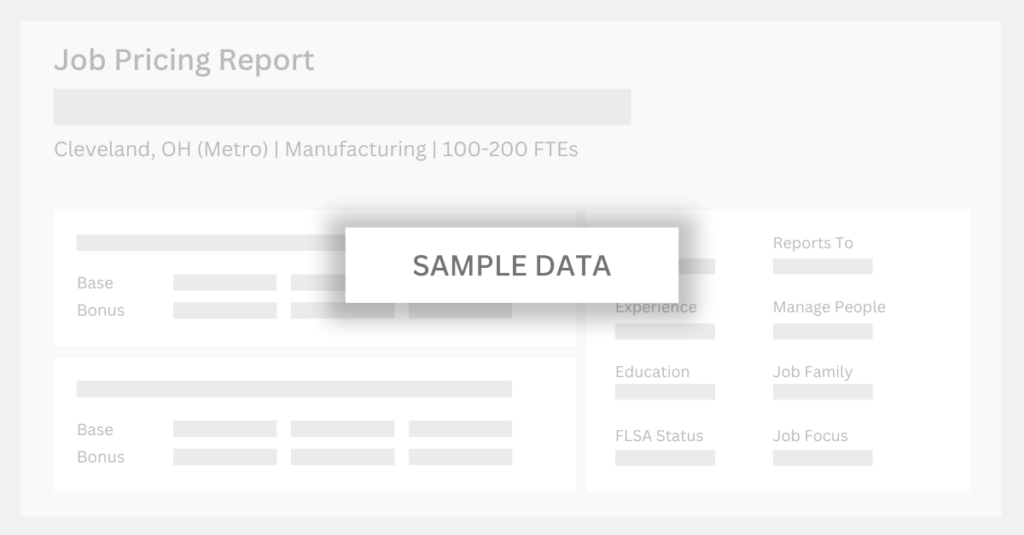Compensation Data for a Payroll Administrator in Ohio

Compensation data breakouts:
- Location (example: Cleveland, Akron, Ohio, National)
- Company Size (number of full-time employees)
- Industry (industry-specific or all industries)
- Years of Experience
- Education
Data included in each report:
- Base Compensation (Salary or Wage)
- Total Compensation
- Bonus
- Long-term Incentives
- Job Description
- Competencies/Skills
Get a Free Sample Report
Submit the form below to receive a sample job pricing report or to access ERC’s compensation data.

ERC is a leading provider of compensation data
Whether you’re actively recruiting and hiring or trying to stay competitive, having local salary and wage data is critical. ERC members gain access to compensation reports, job description research, and an HR Help Desk for compensation and workplace practices data.
Job Description
Overview
- Administers processing of organization’s payroll and collects payroll data to maintain accurate payroll records.
- Handles processing of employee status changes, analyzes payroll and employee expenses, assures general ledger accounts are reconciled; creates on-going month-end, quarterly, and year-end organization reports; and performs other rated duties as assigned.
- Audits payroll information for accuracy.
- Reconciles payroll deposits, tax withholdings, wage garnishments, and voluntary deductions.
- Participates in problem solving and special projects within the Payroll Department.
- Assigns exempt and non-exempt worker status to employees.
Typical Functions
- Prepares responses to notices from government agencies regarding employee tax filings.
- Assures that payroll-related transactions are processed in compliance with external and internal policies.
- Performs actions necessary to track and determine regular and overtime pay, and factors commission-based income or bonuses into an employee’s salary.
- Calculates and processes Federal and State tax and social security withholdings, union dues, and other deductions, insurance, benefits, pension/retirement, 401(k) contributions and company match, and profit sharing.
- Screens time-worked inputs for calculating, coding, or other errors.
- Monitors computer reports alerting Payroll Clerks to problems or errors.
- Reconciles errors and maintains payroll records.
- Reviews and processes payroll adjustments, including vacation, sick, and other time off.
- Generates accrual entries, as required.
- Fields and responds to payroll inquiries and resolves discrepancies as required.
- Maintains knowledge of rules and laws which govern the payroll administration practices.
- Assists with training of Payroll Clerks.
- May prepare Accounts Payable check requests as necessary.
Similar Positions
There are several positions that share similar responsibilities to a Payroll Administrator, including:
- Payroll Specialist
- Payroll Coordinator
- Payroll Analyst
- Payroll Officer
- Payroll Clerk
- Payroll Assistant
- Payroll Consultant
- Payroll Supervisor
- Payroll Manager
Experience and Education
A Payroll Administrator typically needs a combination of education, experience, and skills to effectively handle payroll responsibilities. While specific requirements may vary depending on the organization, a strong foundation in payroll administration is essential. This experience can be gained through previous roles in payroll departments or related positions where the individual has been responsible for payroll processing, calculating wages, managing timekeeping systems, and ensuring compliance with applicable laws and regulations.
Familiarity with payroll software and systems, as well as a solid understanding of payroll tax regulations, benefits administration, and general accounting principles, is also important. Attention to detail, strong numerical and analytical skills, and the ability to work with confidential information are critical.
Additionally, excellent communication and interpersonal skills are valuable for addressing payroll inquiries, collaborating with internal stakeholders, and maintaining positive relationships with employees.
Competencies and Skills
- Payroll processing
- Payroll systems and software
- Payroll taxation
- Benefits administration
- Compliance and regulations
- Numerical and analytical skills
- Time management and organization
FAQ
The classification of a Payroll Administrator as an exempt or non-exempt position depends on various factors such as job responsibilities, salary level, and applicable labor laws. In general, Payroll Administrators are more likely to be classified as non-exempt, meaning they are eligible for overtime pay and must adhere to the Fair Labor Standards Act (FLSA) regulations.
However, certain exceptions may apply based on the specific job duties and requirements of the role, as well as local employment laws. It is essential for organizations to consult labor laws and regulations in their jurisdiction and consider the specific circumstances of the role to determine the proper classification of a Payroll Administrator as exempt or non-exempt.
Through frequent polls and surveys, ERC offers a comprehensive collection of recent, reliable data covering workplace practices, employee compensation, benefits, wages, and salaries from local, regional, and national samples.
While “free” compensation data can be found on the web, here’s why you should be cautious:
- Validity — Often “free” salary data is collected from anyone willing to participate or share information. This means you don’t have a good sense of how big the sample size is, the geography of the data, or the type or size of organizations from which the data is being collected.
- Recency — ERC’s survey data relies on regular and consistent participation to ensure that the data is recent, while “free” pay data sources may provide data that is many years old.

